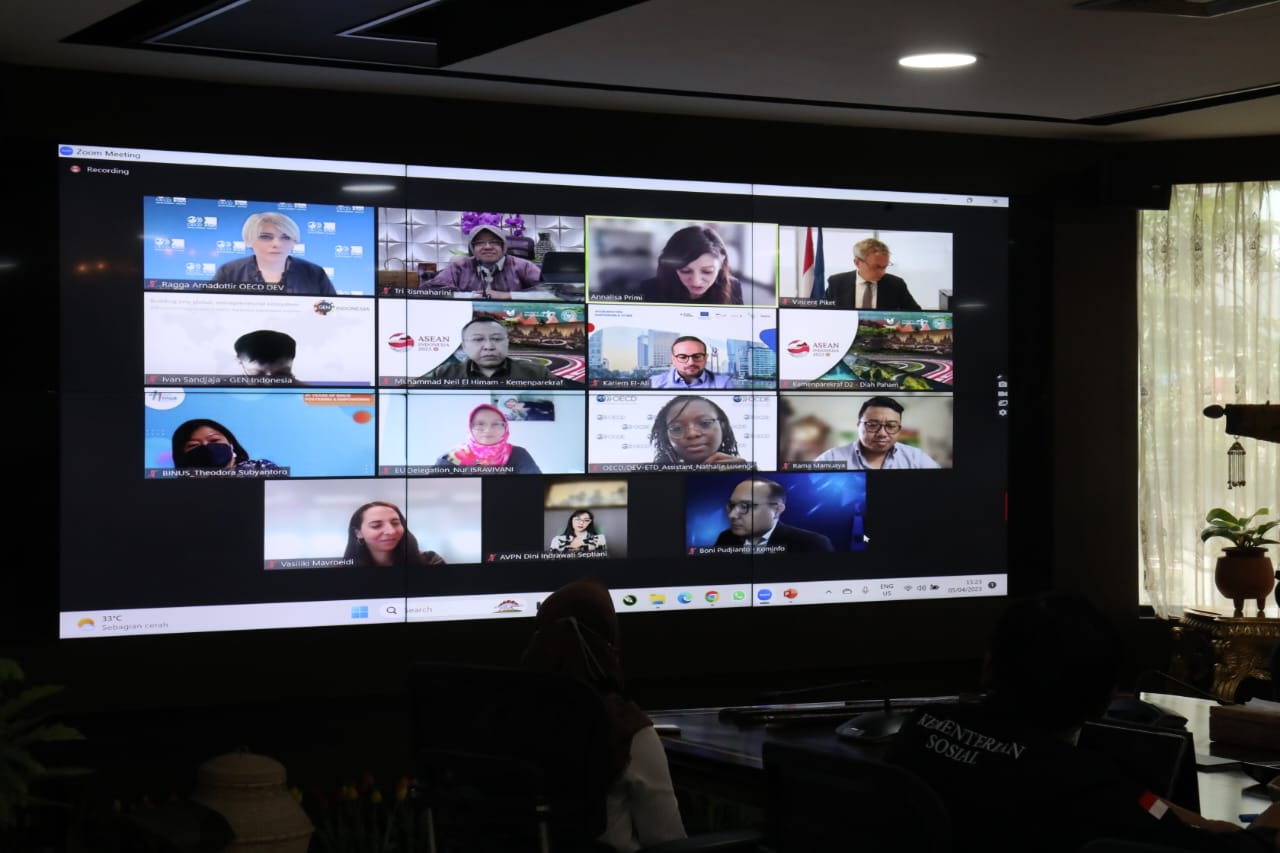Minister of Social Affairs Introduces PENA Program on OECD International Economic Forum

Translator :
Karlina Irsalyana
Jakarta (April 6, 2023) - Minister of Social Affairs
Tri Rismaharini revealed that the empowerment program is the government's
effort to overcome poverty. One of the efforts of the Ministry of Social
Affairs in social empowerment is to develop National Economic Hero Program
(PENA).
In the High-Level Roundtable forum "Startup Asia: Chasing the
Innovation Frontier – The Case of Indonesia" organized by OECD
(Organization for Economic Co-operation and Development) Development Center and
the EU online, in Jakarta, Wednesday (05/04), The Minister of Social Affairs
gave an example of PENA idea, a duplicate from Economic Program (PE) Surabaya
in 2010 which succeeded in reducing the poverty rate in Surabaya City when she
was Mayor.
"This approach (economic empowerment) was duplicated and modified
for a national program called PENA," said the Minister.
PENA program provides training and mentoring to build the capacity of
beneficiaries to create sustainable entrepreneurship or startup.
"When I started, poverty in Surabaya reached 14%. This step was
taken as a milestone. Reaching only 86 women from suburban areas in Surabaya,
we started Economic Hero (PE) Surabaya in 2010," she said.
During that ten-year journey, she said, participants grew from 86 to
12,382 in 2020. Some of the group went on to master skills and reached new
heights as millionaires and billionaires. The poverty rate dropped dramatically
to 5%.
Similar to PE, PENA Program was then duplicated and modified by the
Ministry of Social Affairs during her leadership era. PENA, an entrepreneurship
program targets the poor and vulnerable groups, naming beneficiaries of social
assistance programs (Family Hope Program and Basic Food Program) by providing
training and assistance to grow sustainable businesses. The difference between
PE and PENA programs is in PENA program with capital assistance adjusted to the
business plan or business of the beneficiary.
"Last year, we started with 5,209 families and have been planning
to expand further to 7,500 families this year," said Minister Risma.
PENA beneficiaries are selected through a series of selection processes with
certain criteria such as the productive age group and having a startup
business. The business idea plan is then submitted until it is processed for
selection. If accepted, the recipient will get the full benefits of PENA in the
form of capital and business consulting.
"All
PENA beneficiaries are given access to weekly sessions with mentors who assist
them in product development, digital marketing, and financial management,"
said Risma.
Not only that, but Ministry of Social Affairs also
encourages inclusive economic empowerment by targeting PENA program for persons
with disabilities.
"If persons with disabilities, homeless,
beggars and other street people groups can do it, anyone can do it too. I
believe that everyone can live a better life future, and get out of
poverty," she said.
Since 2016, Indonesia has supported startup
development through several programs, namely incubation support and mentoring
to grow innovations with the aim of inclusive and sustainable development.
At this moment, the Director of OECD Development
Center Ragnheiður Elín Árnadóttir said, OECD places Indonesia as a top priority
on the development agenda.
"We realized after seeing the (Indonesian
government's) innovation explanation on forming entrepreneurship is the key to
increasing economic growth," she said.
Minister of Tourism and Creative Economy,
Sandiaga Uno, who was also present at the forum, said that the role of
Indonesian Government, Ministry of Social Affairs, Ministry of Tourism and
Creative Economy, and Ministry of Communications and Informatics in developing
startups that do not only generate economics impacts but also provides
additional social and environmental benefits. "The government is very
concerned about startup programs such as inviting, training, promoting,
domestically and abroad," said Sandiaga.
Meanwhile, the European Union Ambassador to
Indonesia and Brunei Darussalam Vincent Piket said that examples of startup
conditions in Indonesia showed rapid growth. At the same time, the government
has opened opportunities to increase the income of poor people by providing
access to technology and various services.
"A good growth agenda in Indonesia to help
accelerate economic growth, Mr. Sandiaga Uno said in his remarks, and thanks to
Minister of Social Affairs Tri Rismaharini for continuing to support entrepreneurship
for vulnerable groups and persons with disabilities. This can certainly be used
as an example for other countries in making micro business units, new startups
for the poor communities to become empowered and independent," he said.
Annalisa Primi, Head of Development and Economic
Transformation at the OECD Development Center, also expressed her highest
appreciation for what Social Affairs Minister Risma has done so far.
"Thank you, Minister Risma, for the real
efforts to form micro-inclusive entrepreneurship to help the poor become
prosperous. Good practices that other stakeholders can emulate," she
concluded.
Also attending the event, Ministry of
Communications and Informatics, representatives of both national and
international organizations/institutions, and representatives of other
Indonesian startups.

 English
English
 Bahasa
Bahasa
